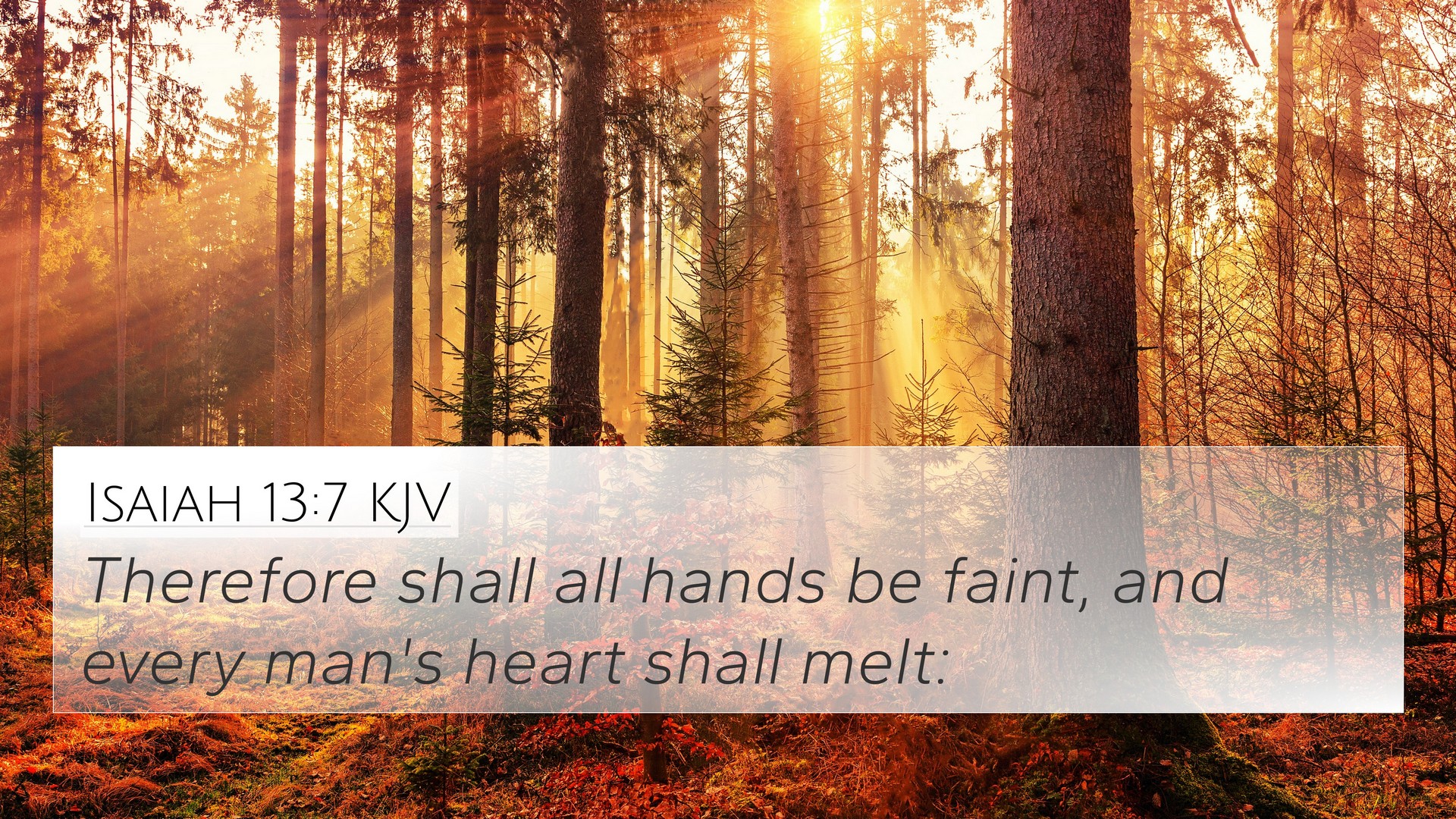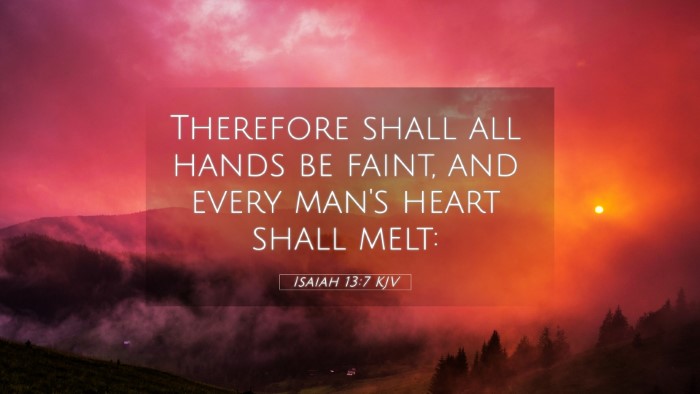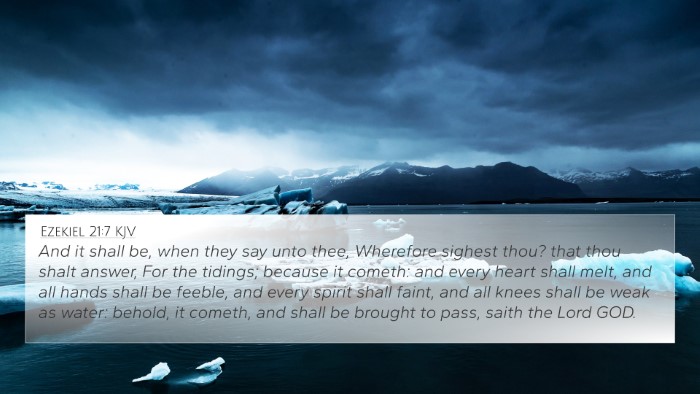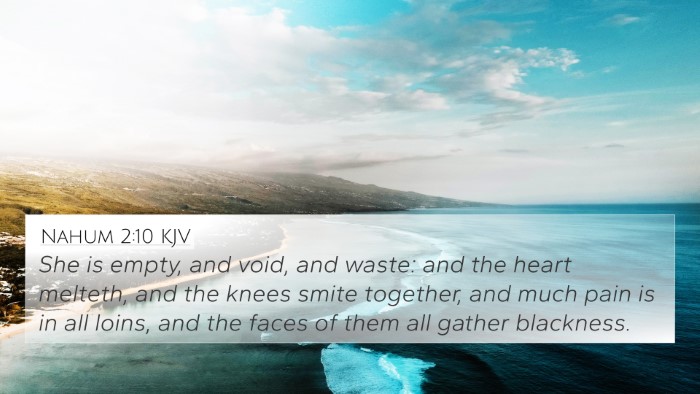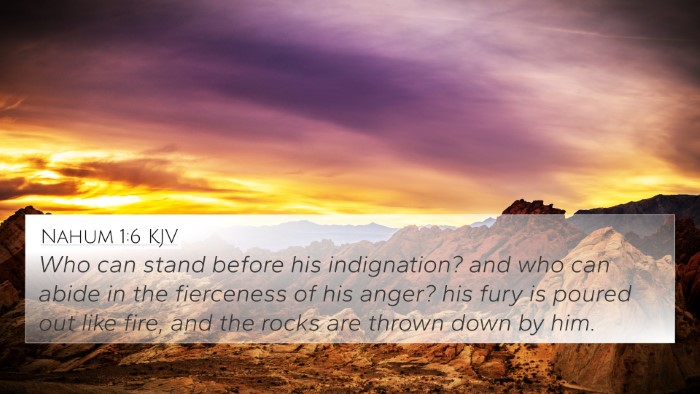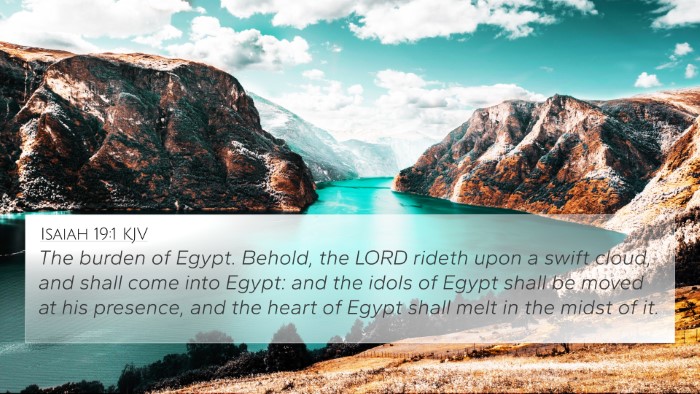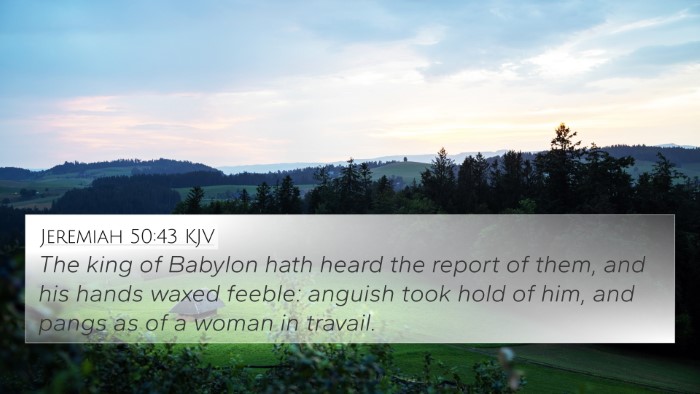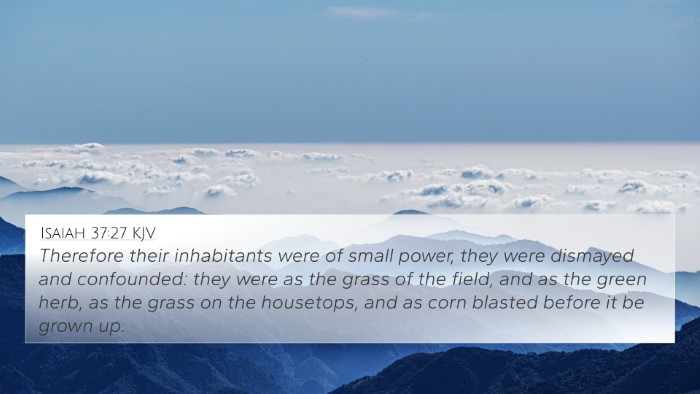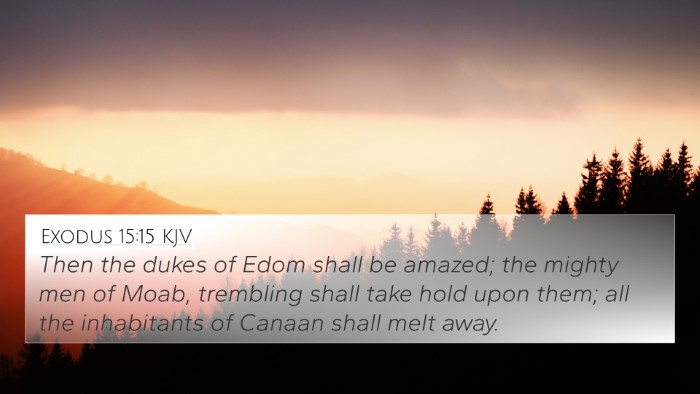Understanding Isaiah 13:7
Isaiah 13:7 states: "Therefore shall all hands be faint, and every man's heart shall melt." This verse occurs within a context of prophetic judgment, where the prophet Isaiah foresees the calamity that will come upon Babylon due to its arrogance and hostile actions against God's people.
Exegesis and Interpretation
In this verse, the imagery evokes a sense of deep emotional turmoil among people facing impending judgment. The words "hands be faint" and "heart shall melt" symbolize a loss of strength and courage. Matthew Henry emphasizes the psychological effects of God's judgment, suggesting that fear will overwhelm the people as they realize the severity of their situation.
Albert Barnes elaborates that this verse remarks on the universal dread that accompanies divine retribution. The phrase "hands be faint" suggests inactivity and a paralyzing fear, while the melting of hearts indicates a profound psychological collapse that can overcome even the mightiest of warriors. Such fear serves as divine punishment, underscoring God’s sovereignty over nations.
Adam Clarke connects this to a broader theme of prophecy, illustrating how God’s judgments are intended not solely to punish but also to elicit a recognition of divine authority and power among those who witness its unfolding.
Bible Verse Cross-References
- Jeremiah 50:43: "The king of Babylon hath heard the report of them, and his hands waxed feeble: anguish took hold of him, and pangs as of a woman in travail."
- Ezekiel 30:4: "For the sword shall come upon Egypt, and great pain shall be in Ethiopia, when the slain shall fall from Egypt, and they shall take away her multitude, and her foundations shall be broken down."
- Isaiah 21:3: "Therefore are my loins filled with pain: pangs have taken hold upon me, as the pangs of a woman that travaileth: I was distressed at the seeing of it; my heart was aching; the horror hath frightened me..."
- Luke 21:26: "Men’s hearts failing them for fear, and for looking after those things which are coming on the earth: for the powers of heaven shall be shaken."
- Revelation 6:15: "And the kings of the earth, and the great men, and the rich men, and the chief captains, and the mighty men, and every bondman, and every free man, hid themselves in the dens and in the rocks of the mountains."
- Proverbs 12:25: "Heaviness in the heart of man maketh it stoop: but a good word maketh it glad."
- Isaiah 33:14: "The sinners in Zion are afraid; fearfulness hath surprised the hypocrites. Who among us shall dwell with the devouring fire? Who among us shall dwell with everlasting burnings?"
- Matthew 24:30: "And then shall appear the sign of the Son of man in heaven; and then shall all the tribes of the earth mourn, and they shall see the Son of man coming in the clouds of heaven with power and great glory."
- Revelation 1:7: "Behold, he cometh with clouds; and every eye shall see him, and they also which pierced him: and all kindreds of the earth shall wail because of him. Even so, Amen."
- Isaiah 14:5: "The LORD hath broken the staff of the wicked, and the scepter of the rulers."
Connections Between Bible Verses
Isaiah 13:7 can be effectively linked to various themes throughout the Bible, particularly in how divine judgment instills fear among the guilty. Notably, the connections between Isaiah’s prophecies and the New Testament revelations serve to create a framework for understanding God’s ongoing narrative through history.
This verse resonates with the broader biblical theme regarding the state of the heart and hands of men in the face of God's judgment. Both Jeremiah 50:43 and Ezekiel 30:4 echo this fear and incapacity in times of divine rebuke, emphasizing that God’s justice is not limited to a specific people but is applicable to all who oppose His will.
The representation of fear and trembling is a recurrent motif seen again in Luke 21:26 and Revelation 6:15, demonstrating that the emotional and spiritual turmoil Isaiah describes is not confined to ancient Babylon but is a timeless reality for those who stand against God’s decrees.
Comparing Old and New Testament Themes
In comparing Isaiah’s prophecy with New Testament teachings, we find a shared anticipation of divine judgment and the profound personal impact it holds over humanity. The fear described in Isaiah is mirrored in the teachings of Jesus and the prophetic warnings in Revelation.
Isaiah 33:14 and Matthew 24:30 serve as direct correlations, with both emphasizing how awareness of impending judgment results in distress and fear. In both testaments, the revelation of God's power induces a state of dread for those unrepentant, offering a stark reminder of the futility of human strength when faced with divine authority.
This mutual reinforcement of prophetic warnings across both testaments invites readers to consider their posture before God. The teachings encourage an introspective approach to how one navigates a relationship with the Almighty, ultimately providing a way to escape the fate of fear described in Isaiah 13:7.
Tools for Bible Cross-Referencing
Understanding and analyzing Bible verses like Isaiah 13:7 can be greatly enhanced through various cross-referencing tools. These resources allow for deeper study into thematic connections, including:
- Bible Concordance: A comprehensive listing of words and their occurrences throughout the Bible.
- Bible Cross-Reference Guide: A tool for finding related verses easily.
- Cross-Reference Bible Study: A methodical approach to understanding Scripture context by comparing multiple passages.
- How to Use Bible Cross-References: Guidance on utilizing cross-references in personal study or sermon preparation.
Conclusion
Isaiah 13:7 serves as a poignant reminder of the emotional and spiritual ramifications of divine judgment. By examining this verse alongside others through comprehensive Bible cross-referencing, readers can better understand the interconnectedness of biblical messages and themes. This insight not only enriches one's study of Scripture but also strengthens one's faith through an awareness of God’s unchanging nature across both the Old and New Testament.
